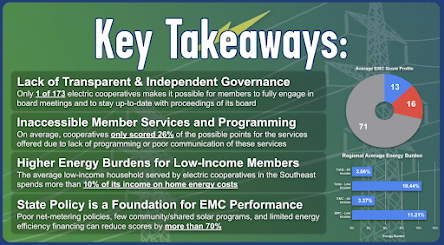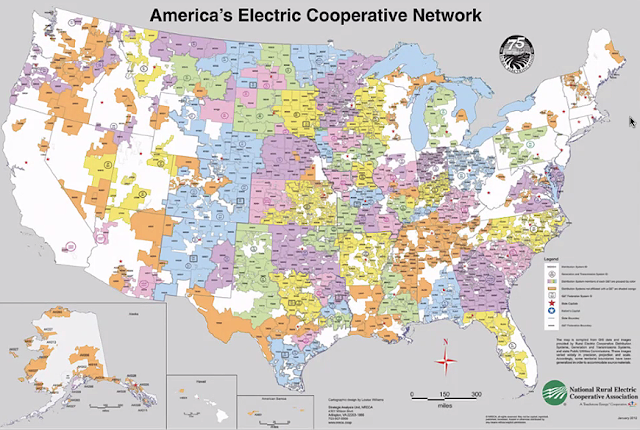 |
| EnergyDemocracy map, adapted by The Rural Blog |
The groups hope the year-long study, funded largely by the groups themselves, becomes a model for other regions, said Rory McIlmoil of Appalachian Voices, a leading group in the coalition. Similar efforts have been made in Minnesota and Montana, he said.
Many Southeast cooperatives don't make their bylaws publicly available or allow members to attend or speak at meetings of their boards of directors, who are elected by the co-ops' member-owners. "There's a lack of transparent and independent governance," Karan Pol of the Partnership for Southern Equity, a Georgia-based group, said in the webinar announcing the results.
 |
| Graphic from Appalachian Voices and EnergyDemocracy; to enlarge, click on it. |
Catherine Robinson of One Voice Mississippi, the state that ranked second lowest, said many co-ops don’t follow the recommendations of the National Rural Electric Cooperative Association for fair and democratic elections.
Kathy Curtis of Kentuckians for the Commonwealth, a cooperative member-owner, said she was unaware that member-owners have a voice in the co-op until she became involved in the project.
The groups based their ratings of individual cooperatives on information gathered from co-op websites, bylaws, conversations with co-op staff and the co-ops' tax returns, which are public because they are nonprofits. Some did not cooperate with the survey, and a lack of information gave them a score of zero, but the groups are still accepting information and will revise the published results accordingly, McIlmoil said.
The groups noted some bright spots, such as Powell Valley Electric Cooperative in northeast Tennessee and southwest Virginia, which made "significant reforms" after member-owners organized, said Bri Knisley, Tennessee manager for Appalachian Voices. She said they have "full engagement," with public-comment periods at meetings that have publicly posted agendas.
 |
| National Rural Electric Cooperative Association map; click to enlarge |
No comments:
Post a Comment